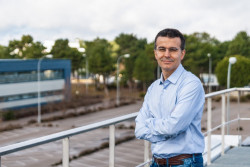Using resources twice over to save money
Over the last four years, three factories in Spain, Italy and Turkey have been testing novel solutions to show how it is possible to cut energy bills and use fewer resources while maintaining productivity. Performed in the food, foundry and textile industries, the experiments are now set to be upscaled in the same fields. Anibal Reñones Dominguez, deputy head of the Systems Division at the Cartif Technology Centre, and coordinator of the European project REEMAIN explains how these results were possible by recovering the lost energy, optimising production and integrating renewables. How do you appreciate the overall outcome of the project (1 October 2013 - 30 September 2017), now that the tests are over? It was a good opportunity to interact with the factories and inform them about the experiments and the energy efficiency outcomes. Usually factories outsource energy saving measures. Under REEMAIN, we engaged with factory managers from the outset and involved them in the selection and design process: they were shown the different technologies and range of energy efficiency solutions; they could make their own decisions according to the technologies’ return on investment and level of innovation. I would like to emphasise that this is a demonstration project. When it ends, we will provide an unbiased evaluation and will recommend in full honesty the best technology for each factory. What kinds of energy saving technologies have been tested in each industry? We did several demonstrations in each industry. We suggested cookies producer Gullon use the outside cold air to produce cold water in a sustainable and efficient way. Therefore, the factory could obtain its own cold water for different stages of the production process, such as cooling the biscuits after removal from the baking ovens or providing air conditioning for the rooms where the chocolate or creams are applied. This would save electricity and be an environmental friendly solution. The biscuit factory is located in the Northern Spain, where the temperatures are low enough during the cold seasons. Biscuits are food products which need to be kept dry and at cooler temperatures. Factories usually prefer a simpler, although less sustainable, electricity-based cooling water system instead of a more complex system capable of drawing on outside renewable resources. Another example is the recovery of the wasted heat from the baking oven chimneys. This can be used to preheat the ovens instead of using natural gas. At textile factory Bossa, in Turkey, we tested the impact of using organic raw materials such as cotton and indigo dye in the manufacturing processes. We also tried to make the residual waters from the industrial process more ecological. The textile industry requires a lot of water, especially for dying the denim fabrics. To neutralise the waste water before releasing it into the nature, the factory’s workers used to add sulfuric acid. We suggested carbonic acid instead, which is more ecological. It avoids the formation of salts in the treated water, which is what happens when using sulphuric acid. The factory now plans to capture CO2 from the boilers and use it to treat water. The foundry is a typical example of where a lot of energy is used for melting iron. The exhaust fumes from this process are very hot (400-600 degrees Celsius) and the industry must cool them down before they are released into the atmosphere. We suggested SCM Group Spa – Fonderie use this heat to produce thermal water. In possibly a couple of years, this thermal water could go onto heating the local district or the factory’s own purposes. Read the full interview: http://www.reemain.eu/News/Articles/Using-Resources-Twice-Over-To-Save-Money.kl
Keywords
saving, energy, energy efficiency, electricity, manufacturing, renewables, food, soundry, textile, technology
Countries
Spain, Italy, Türkiye



